| Srl | Item |
| 1 |
ID:
130117
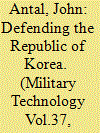

|
|
|
|
|
| Publication |
2013.
|
| Summary/Abstract |
South Korea takes its security issues very seriously. For years the Republic of Korea (ROK) relied on for eign military equipment, primarily from the US, but as the South Korean economy surged, ROK industries became leaders in military technology development and production. One of the areas that the ROK has excelled is in the area of unmanned robotic military systems. This article looks at some of the unmanned systems (UnS) currently developed by the South Korean defence industry.
|
|
|
|
|
|
|
|
|
|
|
|
|
|
|
|
| 2 |
ID:
109761
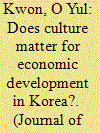

|
|
|
| 3 |
ID:
134076
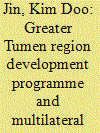

|
|
|
|
|
| Publication |
2014.
|
| Summary/Abstract |
The Tumen River area is considered to be strongly affected by geopolitics, and the GTI programme still has a very long way to go before it can be declared a success story. This article argues that political factors may have a steadily increasing effect on the GTI as part of a geoeconomic micro-regionalist framework. Indeed, political rivalries among the participants often appear more salient than regional
ones. Moreover, an economic explanation for China's involvement in the TRADP is to some extent feasible, but not significantly persuasive. Furthermore, North Korea has tended to be increasingly wary of Chinese investment. Due to the strong South Korean connection with Yanbian, a great concern about rising Korean nationalism has also arisen in the Chinese government. Russia, for its part, may be committed to the project primarily due to its separatist-minded Russian Far East. Japan, however, is not geographically connected by land to the region, but in order to generate positive spill-over effects that include the Japanese economy, the GTI is in need of expanding its geographical coverage to also include the sea area of the East Sea (of the ROK). In the long term, the TRADP need not adhere to the GTI's previous formula of multilateralism. According to policy options, bilateral or trilateral frameworks are preferable.
|
|
|
|
|
|
|
|
|
|
|
|
|
|
|
|
| 4 |
ID:
157598


|
|
|
|
|
| Summary/Abstract |
On 1 July 2011, a free trade agreement was provisionally implemented between the EU and South Korea. At the time, there were clear expectations within the EU business community in Seoul about the likely impact of the deal, including an increase in EU exports, the dismantling of tariff and existing non-tariff barriers (NTBs), the possible emergence of new NTBs, the further development of mechanisms for discussion and problem-solving mechanisms, and a shift in Koreans’ perceptions of all imported EU goods as luxury items. Interviews conducted with expatriate executives, diplomats and trade officials in Seoul in 2015 revealed the extent to which these expectations have been fulfilled and also highlighted the importance of broad economic and social trends in the strong performance of EU exports since 2011. These included the maturing of the Korean economy and the growing need for high-end industrial goods, and the Koreans’ increasing purchasing power and the concomitant desire to engage in displays of wealth. In addition to contributing to the general academic debate on the impact of free trade agreements (FTAs) and adding specific colour to the case of the EU-Korea FTA, this research will play an important role in shaping responses to the shifting economic, social and cultural trends that will impact the future outcomes of this key trade deal between the EU and Korea. It will also inform the EC’s discussions with current and future free trade agreement partners and its analysis of the various factors influencing the actual and perceived success or failure of those deals.
|
|
|
|
|
|
|
|
|
|
|
|
|
|
|
|
| 5 |
ID:
093372


|
|
|
| 6 |
ID:
024569
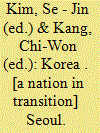

|
|
|
|
|
| Publication |
Seoul, Research Center for Peace and Unification, 1978.
|
| Description |
304p.hbk
|
|
|
|
|
|
|
|
|
|
|
|
Copies: C:1/I:0,R:0,Q:0
Circulation
| Accession# | Call# | Current Location | Status | Policy | Location |
| 018069 | 951.95/KIM 018069 | Main | On Shelf | General | |
|
|
|
|
| 7 |
ID:
024571


|
|
|
|
|
| Publication |
Seoul, Research Center for Peace and Unification, 1978.
|
| Description |
304p.hbk
|
|
|
|
|
|
|
|
|
|
|
|
Copies: C:1/I:0,R:0,Q:0
Circulation
| Accession# | Call# | Current Location | Status | Policy | Location |
| 018070 | 951.95/KIM 018070 | Main | On Shelf | General | |
|
|
|
|
| 8 |
ID:
098046


|
|
|
| 9 |
ID:
111032
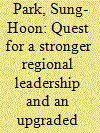

|
|
|
|
|
| Publication |
2012.
|
| Summary/Abstract |
The Korean economy has suffered two major economic crises over the past 15 years - the 1997 Asian financial crisis and the 2008 global financial crisis. After analyzing both the changes in policy environments and Korea's policy responses, the article argues that the ongoing global financial crisis provided a welcomed opportunity for Korea to increase its regional and global influence. Korea's regional leadership has been strengthened especially in promoting the "development" issue in a number of international forums and in establishing a more effective crisis-prevention framework in the Asian region. As the host country of the 5th G20 Summit Meeting in 2010, Korea initiated a number of global issues, such as "development", "global financial safety net", "green growth strategy", and has been successful in fortifying its position in the global arena. As a result, the global profile of Korea appears to have been raised both substantially and substantively.
|
|
|
|
|
|
|
|
|
|
|
|
|
|
|
|
| 10 |
ID:
128277
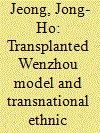

|
|
|
|
|
| Publication |
2014.
|
| Summary/Abstract |
This paper explores why Zhejiangcun's Wenzhou migrants and Wangjing's Chaoxianzu migrants were able to maintain and actively restructure their settlements in Beijing while Beijing's other migrant settlements either disappeared or were forced out from their original locations. Highlighting the role of the Wenzhou model in Zhejiangcun and that of the transnational ethnic ties in Wangjing, this research illustrates how certain rural migrants emerged as a new social group by utilizing their cultural capital based on native-place and ethnic ties and newly found economic power. The present study examines the urban space of Zhejiangcun and Wangjing where alternative sources of economic power and social networks were created and utilized and therefore offers a unique perspective by locating a specifically-founded ethnographic analysis within the general debate on the restructuring of post-reform urban space.
|
|
|
|
|
|
|
|
|
|
|
|
|
|
|
|